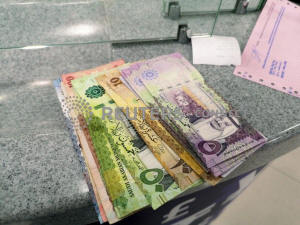|
London pushes to take Saudis off EU dirty
money blacklist: sources
 Send a link to a friend
Send a link to a friend
 [February 08, 2019]
By Francesco Guarascio [February 08, 2019]
By Francesco Guarascio
BRUSSELS (Reuters) - Britain is leading a
group of European Union states who are trying to block an EU plan to
include Saudi Arabia and 22 other jurisdictions on a blacklist of
countries that pose money-laundering and terrorism financing threats,
sources said.
The EU's executive commission adopted last month a draft list that adds
Saudi Arabia, Panama and small Pacific and Caribbean islands to the
existing list of 16 states, which currently includes Iran, Iraq, Syria,
Afghanistan, Yemen and North Korea.
The list needs the endorsement of a majority of the 28 EU nations but
Britain and other heavyweights of the bloc, including Germany, France,
Italy and Spain, are raising concerns, three EU officials told Reuters.
Two of the sources said EU states' reluctance to endorse the list was
mostly driven by concerns over the inclusion of Saudi Arabia and Panama
on the list.
Listed countries face higher scrutiny in their financial dealings with
the EU, with bloc's banks forced to carry out additional checks on
payments involving entities from those jurisdictions.

Britain is the country that is pushing more openly not to include Riyadh
in the list, one official said, while Spain is insisting it excludes
Panama.
Oil-rich Saudi Arabia is a top importer of EU products and weapons,
while Panama is a major financial center in Latin America with many EU
firms involved in the multi-billion-dollar expansion of its
trans-oceanic canal.
British officials were not immediately available for a comment. A
Spanish government official declined to comment.
Countries are blacklisted if they "have strategic deficiencies in their
anti-money laundering and countering the financing of terrorism regimes
that pose significant threats to the financial system of the Union," the
existing EU list says.
Panama's ambassador to the EU Miguel Verzbolovskis said the country had
reformed its anti-money laundering rules and urged the EU not to include
Panama in the new list. Saudi government officials were not immediately
available for a comment.
SAUDI THREATS
Several EU states in a meeting of national envoys this week in Brussels
called for more time to assess listed jurisdictions, the officials said.
They resisted the EU Commission's plan to take control of the listing
process.
[to top of second column]
|

Saudi currency, riyal, is seen at a local currency exchange in
Manama, Bahrain October 16, 2018. REUTERS/ Hamad I Mohammed

This has so far been carried out by the Financial Action Task Force
(FATF), a global body composed by wealthy nations, including half of
the EU countries. The existing EU list mirrors the FATF list of 16
states, while the new one would be expanded by imposing stricter
criteria on countries to avoid listing.
EU states' pressure against the new listing has intensified after a
meeting of EU and Arab League foreign ministers ended with no
agreement on a joint statement on Monday, in a sign of worsening
relations between the two blocs.
Relations between Brussels and Riyadh, which plays a prominent role
in the Arab League, have grown colder after the murder of Saudi
journalist Jamal Khashoggi in the kingdom's Istanbul consulate on
Oct. 2.
A Saudi government team of diplomats has set up shop in Brussels to
lobby against the listing, one EU official and one source in Saudi
Arabia said.
The EU official said the Saudis have threatened to cancel lucrative
contracts in some EU countries.
Two senior officials of the EU Commission said that Brussels was,
however, not inclined to bend to pressure and would formally adopt
the list, with Saudi Arabia in it, in the coming weeks.
EU states could however reject it within two months of its approval
by qualified majority.
(Reporting by Francesco Guarascio in Brussels; additional reporting
by Stephen Kalin in Riyadh and Belen Carreno in Madrid; Editing by
Toby Chopra)
[© 2019 Thomson Reuters. All rights
reserved.]
Copyright 2019 Reuters. All rights reserved. This material may not be published,
broadcast, rewritten or redistributed.
Thompson Reuters is solely responsible for this content.
 |